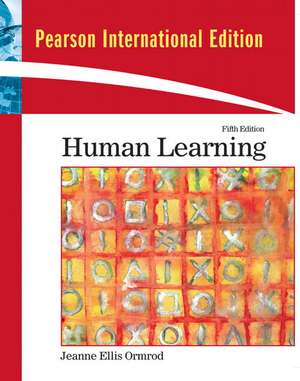Human Learning: International Edition
Autor Jeanne Ellis Ormroden Limba Engleză Paperback – 7 aug 2008
Preț: 441.41 lei
Nou
Puncte Express: 662
Preț estimativ în valută:
84.48€ • 87.87$ • 69.74£
84.48€ • 87.87$ • 69.74£
Carte indisponibilă temporar
Doresc să fiu notificat când acest titlu va fi disponibil:
Se trimite...
Preluare comenzi: 021 569.72.76
Specificații
ISBN-13: 9780137006021
ISBN-10: 0137006020
Pagini: 608
Dimensiuni: 184 x 235 mm
Greutate: 0.95 kg
Ediția:5Nouă
Editura: Pearson Education
Colecția Pearson Education
Locul publicării:Upper Saddle River, United States
ISBN-10: 0137006020
Pagini: 608
Dimensiuni: 184 x 235 mm
Greutate: 0.95 kg
Ediția:5Nouă
Editura: Pearson Education
Colecția Pearson Education
Locul publicării:Upper Saddle River, United States
Cuprins
PART I. Introduction to Human Learning
Chapter 1 Perspectives on Learning
Chapter 2 Learning and the Brain
PART II. Behaviorist Views of Learning
Chapter 3 Behaviorism and Classical Conditioning
Chapter 4 Instrumental Conditioning
Chapter 5 Applications of Instrumental Conditioning
PART III. Social Cognitive Theory
Chapter 6 Social Cognitive Theory
PART IV. Cognitive Views of Learning
Chapter 7 Introduction to Cognition and Memory
Chapter 8 Long-Term Memory I: Storage
Chapter 9 Long-Term Memory II: The Nature of Knowledge
Chapter 10 Long-Term Memory III: Retrieval and Forgetting
PART V. Developmental Perspectives
Chapter 11 Developmental Perspectives on Cognition
PART VI. Complex Learning and Cognition
Chapter 12 Metacognition, Self-Regulated Learning, and Study Strategies
Chapter 13 Transfer and Problem Solving
Chapter 14 Social Processes in Knowledge Construction
PART VII. Motivation
Chapter 15 Motivation and Affect
Chapter 16 Cognitive Factors in Motivation
References
Chapter 1 Perspectives on Learning
Chapter 2 Learning and the Brain
PART II. Behaviorist Views of Learning
Chapter 3 Behaviorism and Classical Conditioning
Chapter 4 Instrumental Conditioning
Chapter 5 Applications of Instrumental Conditioning
PART III. Social Cognitive Theory
Chapter 6 Social Cognitive Theory
PART IV. Cognitive Views of Learning
Chapter 7 Introduction to Cognition and Memory
Chapter 8 Long-Term Memory I: Storage
Chapter 9 Long-Term Memory II: The Nature of Knowledge
Chapter 10 Long-Term Memory III: Retrieval and Forgetting
PART V. Developmental Perspectives
Chapter 11 Developmental Perspectives on Cognition
PART VI. Complex Learning and Cognition
Chapter 12 Metacognition, Self-Regulated Learning, and Study Strategies
Chapter 13 Transfer and Problem Solving
Chapter 14 Social Processes in Knowledge Construction
PART VII. Motivation
Chapter 15 Motivation and Affect
Chapter 16 Cognitive Factors in Motivation
References
Caracteristici
- New! Restructured Organization–The text has been reduced from 18 to 16 chapters to more comfortably fit within the confines of a typical college semester.
- New! Significant Updates to Part 2: Behaviorist Views Of Learning–The coverage of behaviorism has been streamlined and now includes information on punishment as well as on reinforcement.
- New! Developmental Perspectives on Cognition, Chapter 11–Presents material on Piaget’s and Vygotsky’s developmental theories as well as those of the neo-Piagetians
- New! New Research Findings and Topics–Including: how human learning differs from nonhuman animal learning (Chapter 1), the use of high-stakes tests to assess achievement of instructional objectives (Chapter 5), self-efficacy for learning versus self-efficacy for performance (Chapter 6), worldviews (Chapter 9), cultural differences in epistemological beliefs (Chapter 12), problem-based learning (Chapter 13), stereotype threat (Chapter 15), and proximal goals (Chapter 16).
- Learning and the Brain, Chapter 2 — Includes material on the anatomy and physiology of the central nervous system, brain development, and contemporary brain research. Ensures students understand the educational implications of the latest research—debunks several common myths that students, and others, hold about the brain's functions.
- Social Processes in Knowledge Construction, Chapter 14–Explores the social nature of learning, reciprocal teaching, peer tutoring, interaction with technology, and more. Guides readers through the basics of "socializing"—provides exceptionally clear treatment of this often-challenging topic.
- Numerous Exercises and Examples—Interspersed throughout the text. Engage students in relating text concepts to constructed knowledge based on their experiences—illustrates how an educator's personal knowledge base can inform his or her teaching.
- Applications for Instructional Settings—In every chapter. Prepares students to transfer their learning from the academic setting to the professional world—helps prospective teachers gain confidence in their ability to meet the needs of students.
Caracteristici noi
- New! Restructured Organization—The text has been reduced from 18 to 16 chapters to more comfortably fit within the confines of a typical college semester.
- New! Significant Updates to Part 2: Behaviorist Views Of Learning—The coverage of behaviorism has been streamlined and now includes information on punishment as well as on reinforcement.
- New! Developmental Perspectives on Cognition, Chapter 11—Presents material on Piaget’s and Vygotsky’s developmental theories as well as those of the neo-Piagetians
- New! New Research Findings and Topics—Including: how human learning differs from nonhuman animal learning (Chapter 1), the use of high-stakes tests to assess achievement of instructional objectives (Chapter 5), self-efficacy for learning versus self-efficacy for performance (Chapter 6), worldviews (Chapter 9), cultural differences in epistemological beliefs (Chapter 12), problem-based learning (Chapter 13), stereotype threat (Chapter 15), and proximal goals (Chapter 16).
